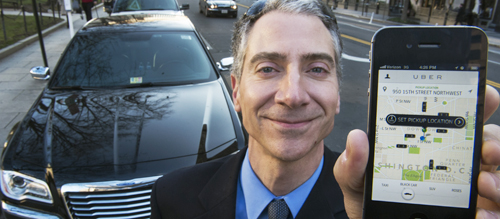Uber: Revolutionary ride-sharing goes places
 If
there is one hot word in the transport industry right now, it is Uber,
the revolutionary ride sharing service that operates virtually all over
the world including Sri Lanka, where the first customer was cricket
legend Kumar Sangakkara. As of May 28, this year, the service is
available in over 66 countries and 449 cities worldwide, according to
Uber. If
there is one hot word in the transport industry right now, it is Uber,
the revolutionary ride sharing service that operates virtually all over
the world including Sri Lanka, where the first customer was cricket
legend Kumar Sangakkara. As of May 28, this year, the service is
available in over 66 countries and 449 cities worldwide, according to
Uber.
Uber and its nearest competitor Lyft have brought a new dimension to
the personal transport industry, one which experts say will eventually
morph into on-demand driverless cars that can take you anywhere in
demand.
Uber was founded as 'UberCab' by Travis Kalanick and Garrett Camp in
2009 and the smartphone app was released the following June. Beginning
in 2012, Uber expanded internationally. In 2014, it experimented with
carpooling features and made many other updates. Most, if not all, Uber
drivers use their own cars and some have questioned this practice from a
safety perspective.
Investment from GM
Uber, headquartered in San Francisco, California, recently received a
US$ 500 million investment from General Motors (GM), as car
manufacturers and even tech firms such as Apple (which recently invested
US$ 1 billion in Chinese road sharing service Didi) scramble to carve a
slice of the future market for fully autonomous electric or hydrogen
powered cars.
|

(Getty Images) Peter Faris, CEO of Szabo Faris LLC
Transportation Solutions, stands in front of one of his
vehicles while holding a smart phone with an app that orders
up his sedan service February, 2013 in Washington, DC. |
The carmakers believe that individual car ownership will dwindle
drastically if firms such as Uber and Lyft deploy on-demand driverless
cars and they want to be ready with those cars. Uber has announced
collaboration with Carnegie Mellon to establish the Uber Advanced
Technologies Center, a new facility to support research in the
development of self-driving vehicles. In fact, Uber is actually
recognized a technology company, not a transport company per se.
Ride-sharing seems to be fast gaining ground at the expense of
traditional taxi services. In fact, there have been huge demonstrations
by taxi operators and drivers against Uber in many world capitals. Taxi
unions, Governments and others have filed lawsuits against Uber for what
they call "unfair trade practices".
A French court last week fined Uber Technologies 800,000 euro
($907,000) for running "an illegal taxi service" with non-professional
drivers and slapped smaller fines on two of its executives in the first
such criminal case in Europe. Uber has been taken off the road in some
cities as a result of litigation and it (along with rival Lyft) has left
some cities such as Austin, Texas on its own.
In the first quarter of 2016, services such as Uber and Lyft
accounted for 46% of business 'ground transportation' trips in North
America, (the biggest market) according to Certify, an
expense-management firm. That compares with 40% for car-hire and 14% for
taxis.
Biggest market
The share of business trips taken by taxi in America has dropped by
23 percentage points over the past two years. Within the ride-sharing
sector, Uber dominates. According to the Economist, Uber has a 69%
market share of business trips and Lyft has 4%.
Lyft had an advantage over Uber in one aspect - the ability to book
cars in advance, a service the firm unveiled earlier this year. With
Uber, on the other hand, clients had to book a ride as and when they
want it.
Uber announced last week that it will follow Lyft's example and allow
riders to book cars between 30 minutes and 30 days in advance. "All
things being equal, that development will sound the death knell for
taxis; expect cabs' share of the business market to diminish to almost
nothing in the coming years. That will leave only one battle worth
watching: that between Uber and Lyft," reports the Economist.
Uber's modus operandi is really simple. The user installs a
smartphone app, which shows nearby Uber cars. When the user indicates he
or she needs a nearby car, just one touch brings the relevant car to the
doorstep. Uber offers luxury and cheap options under names such as UberX,
UberGo and UberPop. It also has a restaurant delivery service in some
countries called UberEATS. Uber has just started a helicopter service in
congested Sao Paulo, Brazil, called Ubercopter.
Uber is also experimenting with a retro service: a telephone dispatch
system that would allow people without smartphones to call a hotline and
order an Uber ride, according to a transit official in Pinellas County,
Florida, USA. |

